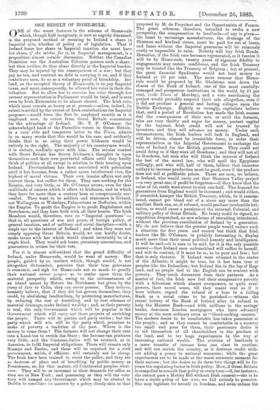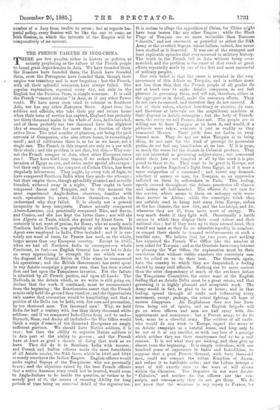ONE RESULT OF HOME-RULE.
ONE of the worst features in the scheme of Home-rule which, though half imaginary, is now so eagerly discussed, is the proposed method of securing to Ireland a share in Imperial acts, whether of policy or of legislation. That if Ireland bears her share in Imperial taxation she must have her share, if she wishes for it, in Imperial management, is a proposition almost outside discussion. Neither the Canadian Dominion nor the Australian Colonies possess such a share ; but then neither do they share directly in the Imperial burden. They may be injured by the consequences of a war ; but they pay no tax, and contract no debt in carrying it on, and if they contribute men, do so as a voluntary proof of friendship. Ire- land, on the accepted theory of Home-rule, is to pay Imperial taxes, and must, consequently, be allowed her voice in their dis- tribution. But to allow her to exercise her voice through her present representation in Parliament would be fatal, and is seen even by Irish Extremists to be almost absurd. The Irish vote, which must remain as heavy as at present—unless, indeed, its extent is settled by the extent of Irish contributions for Imperial purposes—would from the first be employed exactly as it is employed now, to extort from Great Britain concessions for the advantage of Ireland. Mr. T. P. O'Connor, the acknowledged head of the Parnellite voters in Great Britain, in a very able and temperate letter to the Times, admits in so many words that this would be the case, and evidently thinks that in so using their power Irishmen would be entirely in the right. The majority of his countrymen would, it is certain, cordially agree with him. The secular contest with Great Britain has driven Irishmen's thoughts in upon themselves and their own provincial affairs until they hardly think of politics at all except in relation to their bearing upon Ireland. Provincialism has been associated with patriotism until it has become, from a rather mean intellectual vice, the highest of moral virtues. Their own insular affairs not only interest them, but suffice for them. They care nothing for the Empire, and very little, as Mr. O'Connor avows, even for that multitude of careers which it offers to Irishmen, and in which they have for more than a century been so conspicuously suc- cessful. They want to be soldiers and statesmen in Ireland, not Wellingtons or Wolseleys, Palmerstons or Dufferins, within the Empire. To profit the Empire is to profit Englishmen and Scotchmen, and they hate both with all their hearts. The Irish Members would, therefore, vote on "Imperial questions "- that is, all questions of war and peace, of foreign policy, of general taxation, and of military and naval discipline—with a single eye to the interest of Ireland ; and when they were not simply opposing Great Britain, would, we can hardly doubt, make terms with her which would almost invariably be of a single kind. They would ask loans, pecuniary concessions, and guarantees in return for their vote.
For it is almost self-evident that the grand difficulty of Ireland, under Home-rule, would be want of money. Her people, guided by an instinct which, though sordid, is not altogether ill-founded, perceive that their true grievance is economic, and sigh for Home-rule not so much to gratify their national amour propre as to confer upon them the material prosperity which, owing to the circumstances of an island meant by Nature for Dutchmen but given by the irony of fate to Celia, they can never possess. They believe, honestly believe, that if they did but govern themselves, they could, by abolishing landlordism, by protecting manufactures, by reducing the cost of travelling, and by vast schemes of material drainage, make Ireland wealthy ; and, as their poverty is real, the only Government which will be popular is the Government which will carry out these projects of enriching the people. There will be parties and party strifes; but the party which will win will be the party which promises to make of poverty a tradition of the past. Where is the money to come from ? The farmers will not change their rent into a Land-tax to enrich the State ; the Income-tax produces very little, and the Customs-duties will be retained, as in America, to fulfil In}perial obligations. There will remain only Stamps and E-xeise, and these will be required for a civil government, which, if efficient, will certainly not be cheap. The Irish have been trained to resist the police, and they are as desirous of place and of benefiting by public money as Frenchmen, or, for that matter, all Continental peoples what- ever. They will he as incessant in their demands for office as they are in New York ; and possessing as they will the vote, they will compel any Government which may be elected in Dublin to conciliate its masters by a policy closely akin to that
proposed by M. de Freycinet and the Opportunists of France. The great schemes, therefore, intended to evoke a new prosperity, the compensation to landlords—if any is given— the loans to encourage manufactures, the drainage of the Shannon and kindred rivers, must be paid for out of loans, and loans without the Imperial guarantee will be ruinously costly or impossible to raise. Nobody will buy Irish Bonds. Hereafter, if the Irish race becomes regenerated, as it fancies it will be by Home-rule, twenty years of vigorous fidelity to engagements may restore confidence, and the Irish Treasury may be trusted like the Treasury of Belgium ; but at present, the great financial Syndicates would not lend money to Ireland at 10 per cent. The mere rumour that Home- rule would be proposed by Mr. Gladstone sent down the shares of the Bank of Ireland, one of the most carefully- managed and prosperous institutions in the world, by 21 per cent. (vide Times of Monday), and a vote sanctioning the project would probably suspend their sale altogether, even if it did not produce a general and lasting collapse upon the Dublin Exchange. Rightly or wrongly, capitalists believe that, until a period of Revolution has made the Irish masses feel the consequences of their acts, or until the farmers, who are very thrifty and eager for money, protect capital by the bayonet, Irish credit will not be trusted by investors, and they will advance no money. Under such circumstances, the Irish leaders will look to England, and will be driven, almost by irresistible force, to order their representatives in the Imperial Government to exchange the vote of Ireland for the British guarantee. They could not avoid doing so if they were all Goschens ; and they will not all be Goschens, but men who will think the interest of Ireland the test of the moral law, who will spoil the Egyptians willingly, and who will, half of them, believe that immense outlays to increase production must be good, even if the produce does not sell at profitable prices. There are men, we believe, in Ireland, who would carry out that Shannon Valley project —a very great one, if profit be forgotten—if they knew that the value of fat cattle were about to sink one-half. The demand for guarantees from England would be incessant ; and would either, if conceded, hamper the British Treasury, which, be it remem- bered, cannot get blood out of a stone any more than the smallest Bank can, or, if refused, would produce intolerable irri- tation, or would cause a paralysis of the external, Colonial, and military policy of Great Britain. No treaty could be signed, no expedition despatched, no new scheme of recruiting introduced, without the previous conciliation of Ireland by a guarantee. We do not believe that the greater people would endure such a situation for five years, and cannot but think that Irish leaders like Mr. O'Connor, in publicly forecasting it, display much more than their usual political honesty and intelligence. It will be said—it is sure to be said, for it is the only possible answer—that Ireland once enfranchised will suffice to herself, and will be content, if it must be so, to be poor and free ; but that is only rhetoric. If Ireland were situated in the centre of the Atlantic, it might be true, for it has been true of peoples like the Icelanders ; but Ireland lies in the lap of Eng- land, and no people tied to the English can be content with poverty. They catch discontent from their partners. As a matter of fact, the Irish now feel their comparative poverty with a bitterness which almost overpowers, or quite over- powers, their moral sense, till they resent rent as if it were tribute, regard the refusal of a loan to a failing Bank as a social crime to be punished — witness the recent history of the Bank of Ireland after its refusal to help the Munster Bank—and with millions in the savings' banks, denounce London mortgagors who have advanced money at the most ordinary rates as "blood-sucking usurers. The modern desire to be comfortable has taken possession of the people ; and as they cannot be comfortable in a country too small and poor for them, their passionate desire is to rid themselves of all shareholders in the produce of the land, and to try huge experiments in the way of increasing national wealth. The eviction of landlords is a mere transfer of income from one class to another, and will not enrich the country, as it destroys credit with- out adding a penny to national resources ; while the great experiments are to be made at the worst economic moment for their success ; but the desire to do these two things will be for years the regulating factor in Irish policy. How, if Great Britain is compelled to consult that policy at every turn—if, for instance, she cannot pass a Mutiny Bill without Irish consent—she is to have a stable polio), of her own, we fail entirely to perceive. She may legislate for herself in freedom, and even reduce the
number of a Jury from twelve to seven ; but as regards Im- perial policy, every Session will be like the one to come, an Irish Session, in which the interests of the Empire will be comparatively of no account.



































 Previous page
Previous page